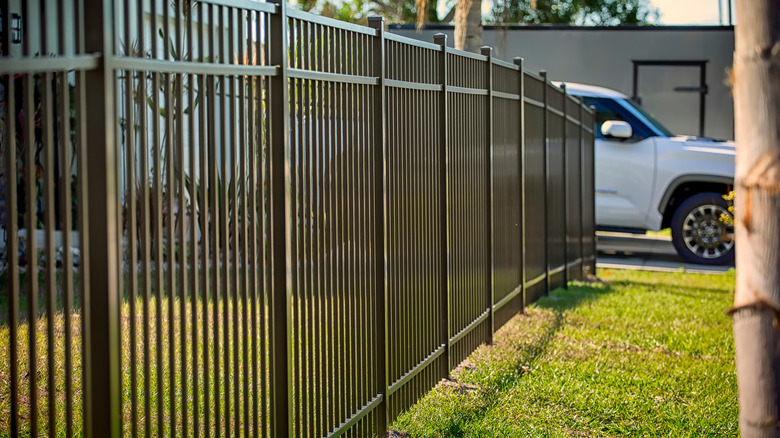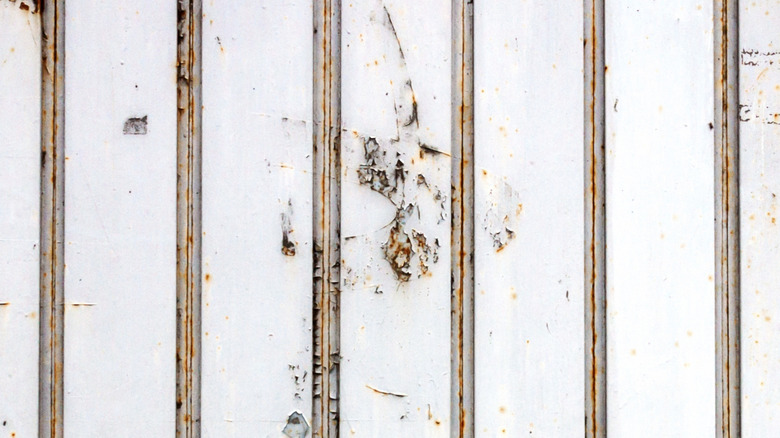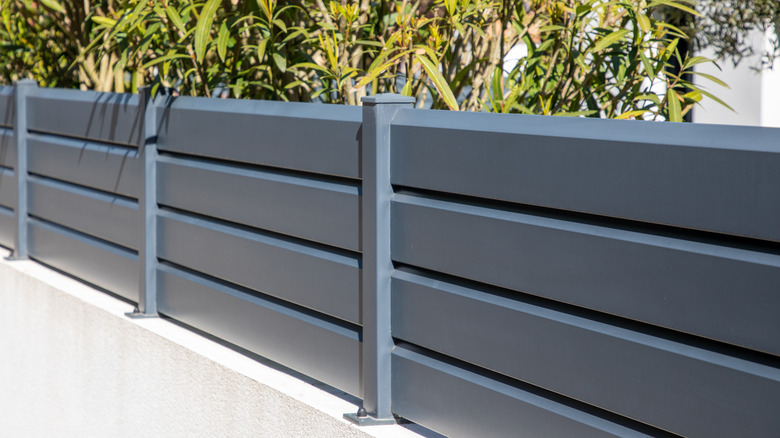This Long-Lasting Fencing Material Is Popular, But It Has Some Downsides To Know About
Choosing the right fencing for your home can be quite a challenge. While for many aesthetics will be the most important aspect, durability is also a key factor. Wood and cast iron are among the classic types of fencing to instantly boost your curb appeal, but both require periodic repainting. PVC doesn't need that kind of maintenance, but it can be susceptible to algae and mold, so it still needs regular work to keep it looking good.
Aluminum is a popular, long-lasting fencing material that can be an attractive alternative. It is very versatile. It can mimic cast iron for picket fencing, is available as ranch-style posts and rails, or works as a variety of vertical or horizontal privacy panels. It comes in a wide range of colors, including wood effect. Many manufacturers use recycled aluminum, so it can also be environmentally friendly.
When it comes to budgeting, you'll find aluminum fencing is competitively priced. The initial cost is higher than wood, but aluminum requires less care and will almost certainly last longer. Steel and iron are both more expensive. So, why isn't everyone using aluminum fencing? Unfortunately, there are a few downsides to know about. It's not the toughest of fencing choices, corrosion can weaken it, and although it's resilient, it does benefit from periodic care. To understand how these might impact your decision-making, let's take a more detailed look.
Aluminum fencing may not rust, but it can corrode
A common claim for aluminum fencing is that it doesn't rust, and while technically that is true, it's actually a little misleading. Rust forms on any metal that contains iron, so as every type of steel contains iron, they will all rust eventually. Aluminum doesn't contain iron, so strictly speaking, it doesn't rust. However, it can corrode, a similar process that eventually causes discoloration or damage.
High humidity and salty atmospheres can be a problem. Likewise, if dirt isn't cleaned from the surface, it can cause a reaction that leads to pitting. If the aluminum has been painted and water gets under the paint, it can cause blistering. Any kind of corrosion, if left untreated, eventually has the same impact as rust, eating through and weakening the structure.
When you are considering the different aluminum fence options that can add style and privacy to your yard, look for a more durable powder coating rather than paint. It's still possible that accidental scratches could damage this surface layer, but there are paints designed for aluminum that will allow you to touch up small areas, making a quick and effective repair. In the long term, even powder coating can fade, but it can be expected to last anywhere from 10 to 25 years.
Aluminum fencing lacks the strength of other metal fence options
Aluminum is much lighter than steel or cast iron, often making for easier installation. However, it doesn't have the same structural strength. Bumping into any kind of fencing with a lawnmower is never a good idea, but the impact of boisterous kids or large pets can be enough to bend aluminum posts or dent panels. Minor bends can often be straightened by hand, and small dents can be repaired with specialist filler or epoxy. Bigger problems may require the attention of a fencing professional. Some argue that this lack of strength might also be a security concern, but a properly installed aluminum fence is at least as strong as wood or PVC.
As resilient as it is, aluminum still benefits from periodic maintenance. An occasional wash with soapy water will remove dirt that can begin to cause damage. An inspection every six months will ensure everything is done up tight so the fence maintains its integrity. It will also help you spot minor damage before it becomes a problem.
Aluminum fencing is a versatile, attractive, and long-lasting option. However, no type of fencing is right for everyone, and aluminum does have a couple of downsides. The information you have now should be a big help in choosing the right backyard fencing for your family's lifestyle or something for the front yard that is eye-catching and easy to live with.


